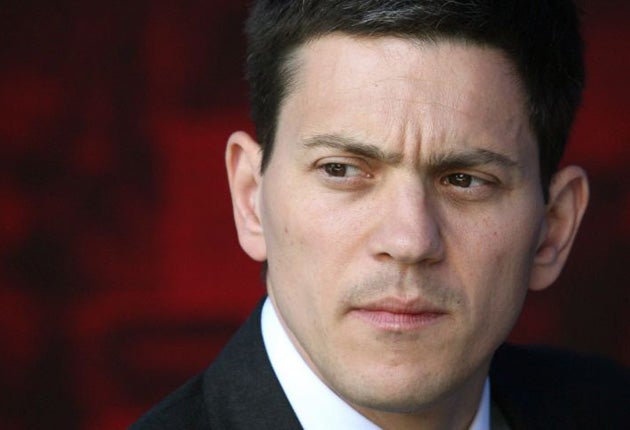David Miliband: this is my ambition for Europe
(But was his pro-EU speech a job application?)

David Miliband issued an impassioned plea to the European Union to "get our act together" or risk being sidelined by America and China as he stepped up the campaign to elect Tony Blair as its first president.
In the most pro-European speech by a British foreign secretary, Mr Miliband warned that the EU – and Britain – risks becoming marginalised by a Chinese-American "G2" elite unless its 27 members dropped their differences to develop a vigorous common international policy. His message contrasts with predecessors' emphasis on the so-called "special relationship" between Britain and the United States. Hours after Mr Miliband set out his vision of a more unified continent punching above its weight around the globe, he travelled to Luxembourg City to gauge support among fellow foreign ministers for Mr Blair's candidacy.
Although Mr Miliband has insisted he is "not a candidate" for the new post of EU foreign minister being created under the Lisbon treaty, his call for the continent to pull together will renew suspicions that he is positioning himself for the job if the former prime minister drops out of the running for the presidency.
Speaking in London, Mr Miliband admitted the European Union was failing to wield as much influence as it should internationally because of weaknesses in the union's organisation.
He said: "Arrangements are ad hoc, co-ordination patchy, messages confused and relationships with the great global powers lacking clarity, strategy or purpose.
"So the choice for Europe is simple. Get our act together and make the EU a leader on the world stage, or become spectators in a G2 world shaped by the US and China."
He added: "I think the choice for the UK is also simply stated: we can lead a strong European foreign policy or – lost in hubris, nostalgia or xenophobia – watch our influence in the world wane."
Mr Milband argued that the Lisbon Treaty, which would create the roles of both president and foreign minister, would give the EU's leaders the opportunity to "rethink and redefine" its strategy around the world.
He said: "The trouble is that at the moment the European whole is less than the sum of its parts. Outside Europe people are confused about what we care about and what we are willing to do. Inside Europe it is not much better; different countries have pet projects but there is not sufficient common purpose."
Who fills the posts of president and foreign minister will not formally be on the agenda at a summit of EU leaders later this week as the Lisbon treaty is awaiting the approval of the Czech government before it is ratified.
But the issue is certain to be discussed in private, with several countries making the case for Mr Blair, as a heavy-hitter well known around the world, as the right man to boost the EU's profile internationally. Downing Street is also putting its weight behind the former prime minister's candidacy.
Mr Miliband said yesterday: "Europe needs a strong voice, and member states have to ask themselves if they want a powerful or a weak Europe. If they want to establish a strong European voice on the world stage, then the question becomes: who are the candidates? It would be good for Britain and for Europe if Mr Blair was that man."
On Sunday he insisted he was "not a candidate" and "not available" for the foreign policy post, adding: "I've got a job I'm absolutely committed to and I'm proud to do."
But he did not rule himself out of the job under all circumstances and some Labour MPs believe be could be tempted to stand were Mr Blair's prospects of obtaining the presidency to fade.
The post could appeal to Mr Miliband as an alternative to a spell in opposition following a likely general election defeat next year.
Although he has been touted as a potential successor to Gordon Brown as Labour leader, he would by no means be certain of winning the job and Labour crashes to a decisive defeat, inheriting a demoralised and factional party might not be an attractive prospect.
At the age of 44, he would also be young enough to return to British politics after a spell in Brussels.
The problem he would face is that he would have to announce his candidacy in the next few weeks, inevitably attracting accusations of deserting a sinking ship.
In his speech yesterday, Mr Miliband argued that an unsuccessful attempt by a Conservative government to renegotiate elements of the EU in the wake of ratification of the Lisbon Treaty could simply lead to demands for Britain to leave Europe altogether.
"The truth is that there is a deception here at the heart of policy – a deception of the country that you can hate Europe as it exists today and remain central to European policy making," he said.
Mark Francois, the shadow Europe Minister, said: "Labour are reduced to begging for bolt holes in Brussels for their politicians before the general election comes.
"Britain needs to work with our European partners on shared global challenges. Britain also needs a Government that will stand up for our interests. Labour's record proves that they are not that Government."
Subscribe to Independent Premium to bookmark this article
Want to bookmark your favourite articles and stories to read or reference later? Start your Independent Premium subscription today.

Join our commenting forum
Join thought-provoking conversations, follow other Independent readers and see their replies